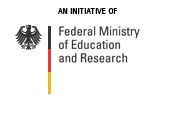Green antibody factories take the fight to cancer and Ebola
-
 <ic:message key='Bild vergrößern' />
<ic:message key='Bild vergrößern' />
- A tobacco protein factory: The molecular blueprint for a specific protein molecule is transported into the leaves on a viral taxi. The plants then go on to produce large quantities of the protein (shown here in glowing green fluorescent protein GFP). Source: Icon Genetics GmbH
27.08.2014 -
The experimental drug ZMapp has gained overnight fame in the fight against the Ebola epidemic in West Africa. The compound from Californian company Mapp Biopharmaceutical is a mix of three antibodies, all of which are directed against the deadly virus. Four of the six Ebola patients administered with the cocktail to date have shown significant health benefits. The unique feature: ZMapp antibodies are produced in tobacco plants. This ‘plantibodies’ procedure was developed by Icon Genetics GmbH in Halle an der Saale, Germany. Some years ago, the company received support from the Federal Ministry of Education and Research (BMBF) as part of the InnoRegio funding initiative. Icon Genetics is also using its plant antibody factories for the development of a personalised immunotherapy for cancer.
In early August, the global headlines surrounding Zmapp also put the 14-employee company Icon Genetics at centre of public attention (more…). This is because Halle is the source of the molecular biological know-how that transforms tobacco plants into efficient factories for antibodies and other therapeutic proteins (‘plant-made pharmaceuticals’).
| More on this subject on biotechnologie.de |
News: How antibodies can fight Ebola |
“Mapp and in particular Kentucky BioProcessing, a company with huge tobacco greenhouses in Owensboro, have already been using our platform for many years,” says Viktor Klimyuk, Manager of Icon Genetics. The cooperation and regular contact between the three companies enables them to stay in close consultation on the progress of the Ebola project. At Kentucky BioProcessing, they are busy boosting production in order to ensure supplies of the now exhausted Zmapp stock.
Infected plants spur antibody production
Plants cannot naturally produce antibodies. The large protein molecules – the guided missiles of the immune system – are found only in humans and animals. Nevertheless, plants are excellent protein factories and, very importantly, they are easy and inexpensive to cultivate and maintain. Aided by a range of molecular-biological tricks, the plants can be reprogrammed to produce large quantities of specific protein molecules. The method developed by the plant researchers is called magnICON, and is based on special tobacco plants of the species Nicotiana benthamiana. These are grown in closed greenhouses in Halle. At the beginning of the process, the molecular blueprints for an antibody are packaged in so-called plant viral vectors. These vectors are then inserted into the plant with the help of agrobacteria. “One week later, the mass-produced antibodies can be harvested from the leaves and other plant parts,” explains Klimyuk. The trick: the infected plants only produce the protein temporarily. Moreover, they are not substantially genetically modified by the procedure. Indeed, the so-called viral vectors cause the tobacco plants to catch something of a ‘head cold’, albeit a very productive one: Depending on the approach, one kilogram of biomass can isolate up to 2.5 grams of recombinant protein, says Klimyuk. “The process is fast, productive and significantly less expensive than the use of animal cell cultures,” says Klimyuk.
Companies with choppy history
The managing director and founder of Icon Genetics is molecular biologist Yuri Gleba, a native of Ukraine. His company can already look back on an eventful history: After its founding in 1999, the BMBF supported the company between 2001 and 2005 with around 1.8 million euros in the framework of the innovation initiative InnoRegio InnoPlanta. In 2006, the team headed by Gleba and Klimyuk achieved a remarkable deal: Bayer Innovation GmbH acquired the company for a seven-figure sum.
The Leverkusen-based company has also invested in a pilot plant for antibody production in Halle. The 200 square-metre facility, including greenhouses and laboratories, has been constructed to allow the proteins to be manufactured according to good manufacturing practice (GMP). “The competent authorities in the United States and Germany have tested and accepted our manufacturing method for therapeutic proteins,” says Klimyuk. In 2010, Bayer and Icon Genetics began a Phase I clinical trial for ‘plantibodies’, which is aimed at testing a personalised cancer immunotherapy for non-Hodgkin's lymphoma. In this case, personalised means a specific antibody molecule produced in plants for a specific patient.
Cancer immunitherapy shown to be safe
In 2012, Bayer withdrew as part of a consolidation of their portfolio. Icon returned into Yuri Gleba’s hands and now operates as a subsidiary of Nomad Bioscience GmbH in Munich. The clinical study, which was conducted in numerous US clinics, continued to receive funding from Bayer. The first results were presented in January this year. “The treatment has proven to be very safe and well tolerated,” summarises Klimyuk. Now the search is on for strategic partners for the next stages, as well as for the development of new application areas. Klimyuk is optimistic: “We are confident that our method has found its niche in biopharmaceutical production. ”Meanwhile, the companies in Halle are planning to expand and are on the lookout for possible locations. This green approach to protein production has now been given a further boost as a result of the attention directed towards ‘molecular pharming’ by the Ebola epidemic.





